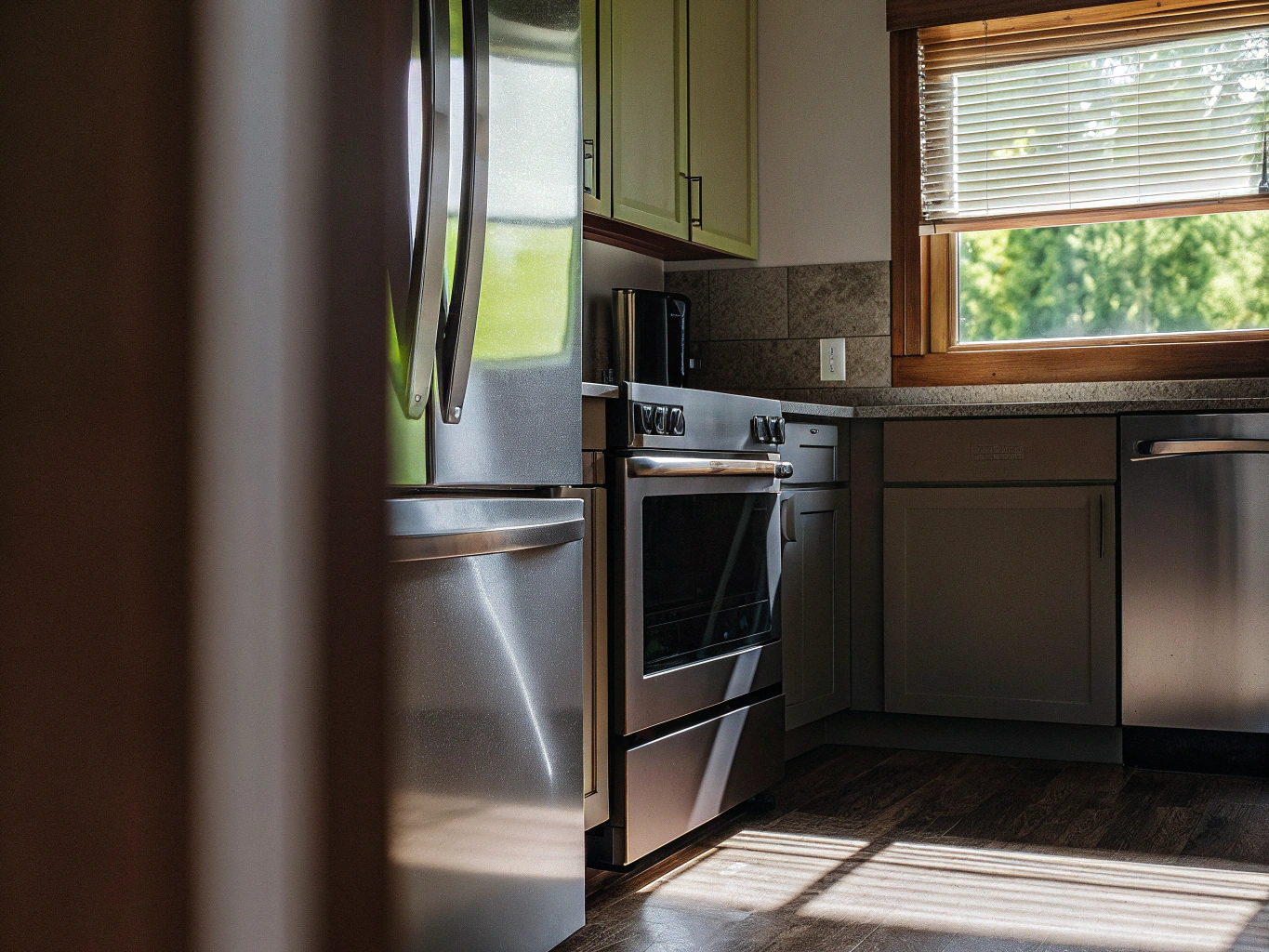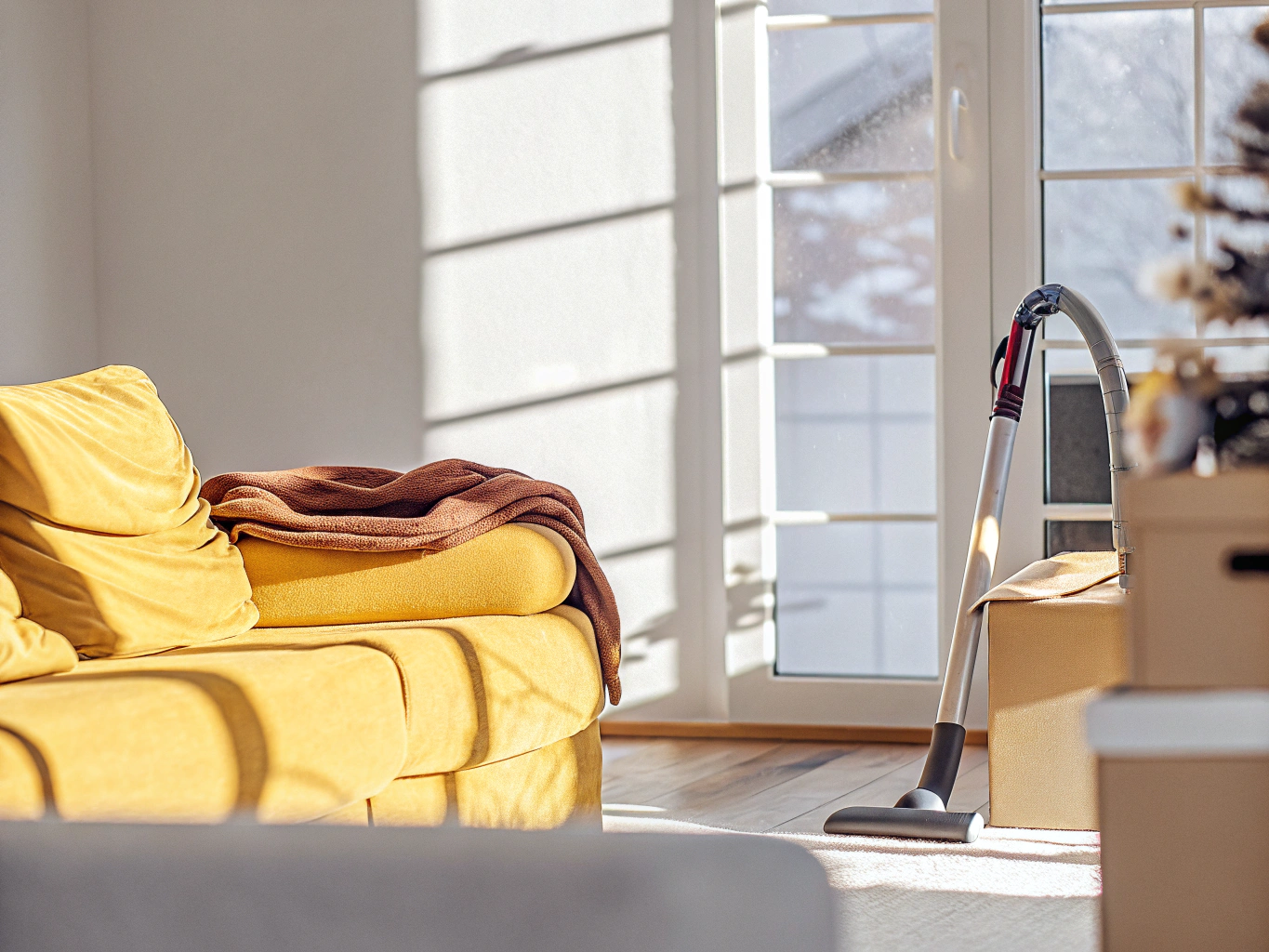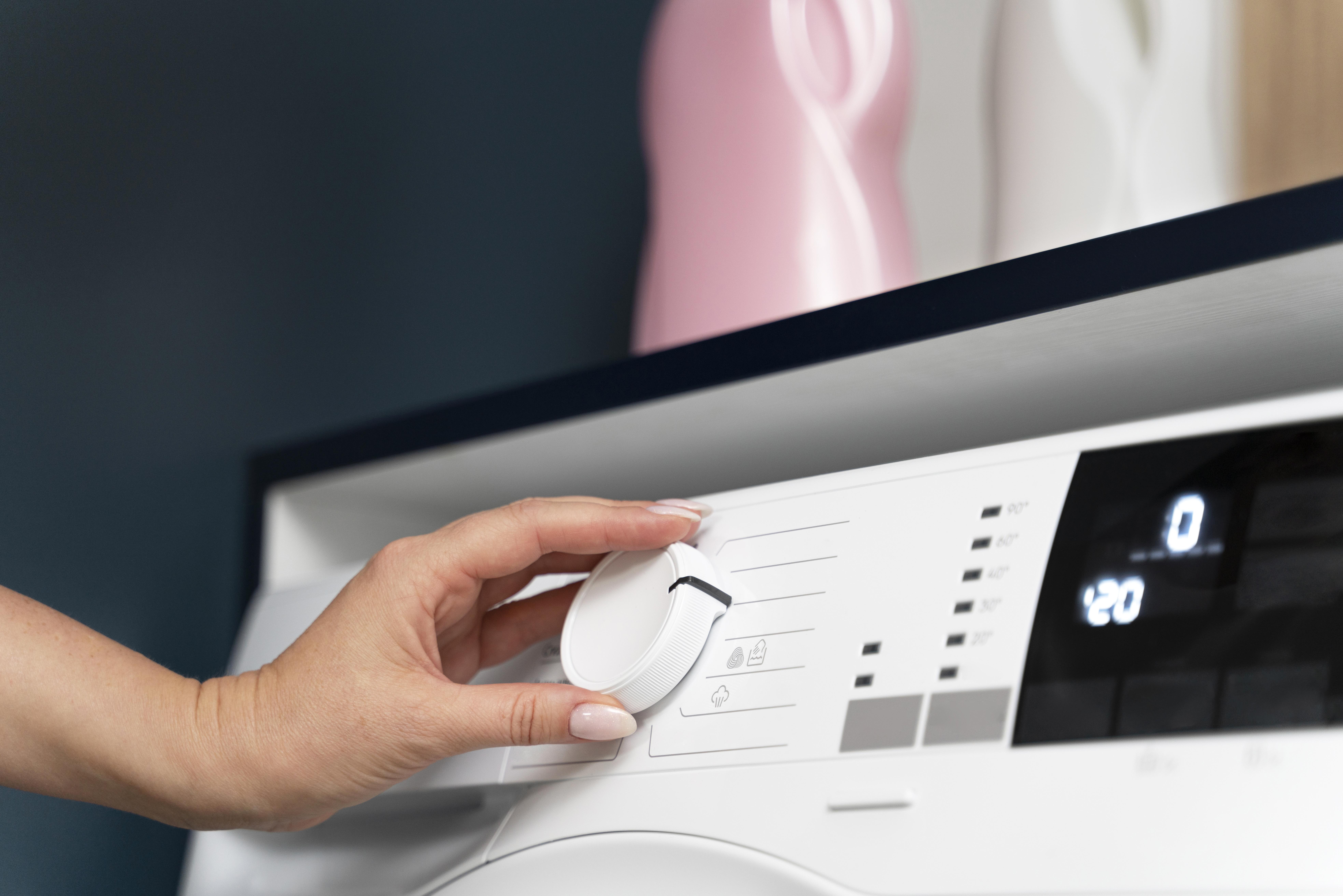Cleaning Green with White Vinegar
Good old-fashioned white vinegar is an inexpensive and effective cleaner for your whole house. Without a list of chemical ingredients, vinegar cuts grease, grime, stains, and odors in your kitchen, bathroom, living areas, and on windows and floors. Vinegar’s mild acidity means that it can dissolve mineral deposits, salts, and dirt; it can also kill some germs and bacteria. White vinegar is also non-toxic and biodegradable, making it safe to clean around children and pets. We’ll show you how to clean with vinegar – from the kitchen to the bathroom to the rest of your house – while explaining key safety tips and when it’s time to call a professional deep cleaning company.
Kitchen Cleaning with White Vinegar
A natural grease-fighter and sanitizer, vinegar can be a useful multi-tasker in the kitchen if you have the right tips and tricks. When using vinegar, always dilute it in water for routine cleaning (unless otherwise noted) to prevent damage to finishes (generally 50/50 or 1:2 vinegar to water).
Here are the main things in the kitchen you can clean with vinegar:
- Countertops and Kitchen Surfaces: Mix vinegar and water in a spray bottle and spray countertops, stovetop, backsplash, and any other kitchen surfaces. Wipe with a microfiber cloth to cut through food splatters and grease and leave a streak-free shine. (Exception: never use vinegar on natural stone surfaces, including granite and marble counters, as the acid in vinegar can etch stone.) White vinegar works well on laminate countertops, tile backsplashes, stainless steel appliances, or any other surface that won’t be damaged by the acid.
- Sink and Drain: White vinegar can freshen your kitchen sink as well. Plug the drain, pour about a cup of vinegar into the sink basin, and use a sponge to scrub the sink and faucet. The acidity will help remove mineral deposits from a stainless steel or porcelain sink. Remove the plug and allow the vinegar to drain – it will help neutralize odors and bacteria in the drain pipe. For tough stains or odors, sprinkle 1/2 cup baking soda in the drain, then pour in 1 cup vinegar. This creates a fizzing reaction that can help dislodge small clogs and really deodorize the drain. Flush the drain with hot water 5–10 minutes after the fizzing stops.
- Appliances (Fridge, Microwave, Dishwasher): Vinegar is safe for cleaning most appliances. Empty the fridge and wipe down the interior surfaces with a vinegar-water mixture (50/50) to sanitize and deodorize. In the microwave, microwave a bowl of 1 cup water and 1/4 cup vinegar for a few minutes until the mixture steams up. Wipe the inside of the microwave with a cloth or sponge to remove softened splatters. Place a cup of vinegar in the top rack of the dishwasher and run a hot empty cycle. The vinegar will remove soap scum and musty odors and leave your dishwasher fresh and clean. You can also run a cycle with a 50/50 solution of vinegar and water to descale a kettle or coffee maker – just rinse thoroughly when finished.
- Stovetop and Oven: Spray vinegar on tough grease splatters on your stovetop and let the vinegar sit for a few minutes. Wipe with a cloth or sponge to clean – the vinegar will cut through the oily residue. (Tip: this also works for a glass stovetop to clear cooked-on splatters.) Vinegar is also a great ingredient in an all-natural oven cleaning recipe. Sprinkle baking soda on the oven floor and walls, then spritz the vinegar over it. The foaming action of the vinegar on baking soda helps lift burnt-on grime and stains – let it sit a while to loosen the gunk, then use a sponge to scrub it out. (Important: never mix vinegar with oven cleaners or bleach-based products.)
👉 For more natural home care tips and wellness inspiration, visit LuminaLife.ca.
Bathroom Cleaning with White Vinegar
Soap scum, hard water buildup, and bathroom germs are all things vinegar can help combat in the bathroom. The acidity of vinegar dissolves mildew and hard-water mineral buildup; it also kills many bathroom germs. Here’s how to use vinegar effectively in your bathroom:
- Shower and Tub: Mix white vinegar and warm water in a spray bottle (1:1 ratio, or even full-strength for tough soap scum) and spray down your shower walls, bathtub, and fixtures liberally. Allow the solution to sit for about 5–10 minutes before wiping down with a sponge or cloth – the vinegar will break down soap scum, hard-water stains, and mild mildew. Rinse with warm water when finished scrubbing. For a clogged showerhead, remove the showerhead and soak in vinegar for several hours or overnight (alternatively, tie a plastic bag filled with vinegar around the showerhead). Vinegar will dissolve mineral buildup and help restore water flow. (Tip: Rinse showerhead thoroughly before reattaching.)
- Toilet Bowl: White vinegar is a great natural toilet bowl cleaner. Pour 1–2 cups of vinegar into the bowl, ensuring to splash vinegar around the sides of the bowl. Let it sit for at least 30 minutes (or longer for stubborn stains and odors, even overnight if possible). Sprinkle some baking soda into the toilet bowl for a fizzy reaction that helps with the cleaning. Scrub the bowl with a toilet brush (especially around any stains or under the rim) and flush. Vinegar helps dissolve mineral buildup (including that pesky toilet ring) and helps deodorize the bowl.
- Sink, Mirror, and Fixtures: Spray vinegar and water (1:1 ratio) on your bathroom sink, countertops, and faucet. The solution cuts through toothpaste splatter, soap drips, and water spots on chrome faucets. For the bathroom mirror and any glass shower doors, a vinegar and water solution will leave a streak-free shine: spray and wipe with a microfiber cloth or paper towel. (Tip: If glass has streaks, try polishing with crumpled newspaper after cleaning.) Vinegar also disinfects handles and knobs: spray and wipe to naturally kill bacteria and germs.
- Tile and Grout: Vinegar works on bathroom tiles too. Spray white vinegar on tiles and grout lines, let sit a few minutes, then scrub with a brush. The solution will help lighten soap scum and mildew in the grout. Rinse with warm water after scrubbing. Be careful not to let vinegar sit on porous or unsealed grout for too long, as it can eventually weaken the grout over time. Vinegar works well on regular light cleaning, but for deeper stains or discolored grout, you may need a more specialized cleaner.
Living Room and General Areas
In the living areas of your house, you can use diluted vinegar as an all-purpose cleaner and deodorizer for many surfaces. A weak vinegar-water spray solution will pick up dust and grime from shelves, tables, and doorknobs. (Avoid using vinegar on delicate or unsealed wood and stone surfaces.) Vinegar is also a natural deodorizer: leave a bowl of vinegar out in a smelly room for a few hours to absorb the odor, or lightly spritz fabrics and the air with vinegar. The vinegar smell dissipates as it dries, and it takes the bad odors with it. You can also mix equal parts vinegar and water and spray on small carpet or upholstery stains, then blot with a clean cloth. As always, test on a hidden part of the fabric first to ensure the vinegar doesn’t affect the color.
Windows and Glass
White vinegar and water make a great solution for shiny, streak-free glass. Mix equal parts vinegar and water in a spray bottle and spritz it on your windows, mirrors, and other glass surfaces. Wipe with a microfiber cloth (or newspaper) to remove spots, fingerprints, and smudges without any streaks or film left behind. If the glass is very dirty or greasy, you can add a drop of dish soap to the mixture to help cut through the dirt – then wipe again with plain vinegar-water solution to rinse off any soap. Your windows and mirrors will be sparkling clean with very little effort.
Floors
- Hard Floors (Tile, Vinyl, Laminate): Add ½ cup white vinegar to a bucket of warm water and mop as usual. The mild solution cuts through dirt and grime without leaving any residue and doesn’t need to be rinsed (any vinegar smell will disappear as the floor dries). Never use vinegar on natural stone floors, such as marble or travertine, as it can etch and dull the stone.
- Hardwood Floors: You can technically mop hardwood floors with vinegar, but we don’t recommend doing it too often since the acidity can dull the finish. If you decide to mop sealed wood floors with vinegar, use a highly diluted solution (such as ¼ cup vinegar in a gallon of water) and make sure your mop is only lightly damp – even then, use this method sparingly. For regular wood floor cleaning, use a cleaner specifically made for hardwood that will maintain the wood’s shine.
Need a professional touch? Book your deep сleaning service with LuminaLife today.
Vinegar Cleaning Safety Precautions
White vinegar is a great natural cleaning solution, but it’s still an acid and should be used with care and caution.
Use these tips to help you clean your house with vinegar effectively, without any damage or accidents:
- Never Mix Vinegar and Bleach: Vinegar is an acid and should never be mixed with chlorine bleach. Doing so will produce toxic chlorine gas, which is extremely dangerous. Always store acidic cleaners like vinegar far away from bleach or any other product containing bleach.
- Never Use Vinegar on Certain Surfaces: Vinegar is not safe for marble, granite, or other natural stone surfaces, as it will etch and dull them. Avoid using vinegar on waxed wood, cast iron, or aluminum, as the vinegar can corrode and damage the material. If you’re not sure whether vinegar is safe for a certain surface, test a small hidden area first.
- Dilute the Vinegar for Routine Cleaning: Full-strength vinegar is best used for very tough grime and messes (like toilet bowls or stubborn soap scum). For everyday surface cleaning, dilute vinegar in water. A more mild diluted vinegar solution is often all you need and will also reduce any vinegar odor and risk of damage.
- Ventilation and Skin Care: Vinegar smells strong but it’s not dangerous and will go away once the vinegar dries. If the vinegar odor is too strong or unpleasant, open a window or use a fan for ventilation while cleaning. If you have sensitive skin, wear gloves when handling vinegar and avoid getting it in your eyes (vinegar will sting).
- Label and Store Cleaners Safely: If you mix up a spray bottle of vinegar solution, label it clearly. Store it out of reach of children and pets. Vinegar is much safer than bleach or ammonia, but you still don’t want children accidentally drinking or spilling vinegar around the house.
- Vinegar Isn’t a Strong Disinfectant: Vinegar does kill some bacteria and viruses, but it’s not a broad-spectrum disinfectant. If you need to sanitize (such as with raw meat juices on a countertop or virus concerns), use an appropriate disinfectant after cleaning (never mix it with vinegar).
When to Consider Professional Deep Cleaning
White vinegar is a great product for day-to-day cleaning and light dirt, but sometimes your home needs a little extra care. There are a few instances when it’s best to call in the professionals rather than relying on your DIY vinegar routine and standard cleaning tools. Here are a few of those situations:
- Stubborn or Heavy Dirt and Grime: If your house has years of accumulated dirt, thick soap scum, or deep-set stains that won’t come off with vinegar and scrubbing, professional cleaners can bring in tools and stronger cleaning solutions to make a difference. Cleaning ovens with caked-on grease, heavy mold or mildew in bathrooms, and filthy grout are all things pros have specialized solutions and equipment for.
- Whole-House Deep Cleaning: Maybe your home is so busy that you haven’t had the time or energy for a thorough top-to-bottom cleaning, or you have a special event or guests coming. Professionals can deep clean much faster, and they’ll get into nooks and crannies you may miss. They also take care of the detail work you may skip, such as cleaning inside appliances, scrubbing baseboards, and washing walls, so every corner of your house is truly spotless.
- Moving In or Moving Out: When moving into a new home (or moving out), a deep cleaning ensures your space is really spotless. Vinegar can help with some cleaning, but a professional service will make sure every cabinet, appliance, and nook is thoroughly sanitized and dirt-free. This can be especially useful at move-out if you’re hoping to get your full damage deposit back, or at move-in for a clean fresh start.
- Health Concerns and Allergies: If you have someone in your household with severe allergies, or you have particular concerns about pathogens that vinegar can’t kill, a deep clean by experts can sanitize at a higher level. Pros use hospital-grade disinfectants and HEPA filtration systems to remove allergens like dust mites, pet dander, and pollen that basic surface cleaning may not reach.
- Time and Convenience: Thoroughly cleaning your whole house with DIY methods can take many hours or even days of hard work. If you just don’t have the time, energy, or physical ability to devote to a comprehensive cleaning of this magnitude, a professional cleaning team is a stress-free alternative.
When those situations call, professional cleaning companies can be a lifesaver.
Lumina Life – a trusted family-owned cleaning company in Calgary – offers specialized deep cleaning services to help tackle grime that regular cleaning may miss.
The Lumina Life cleaning team brings the expertise, equipment, and attention to detail necessary to make your home sparkle from top to bottom.
You can get a free quote for a one-time deep cleaning or recurring service to fit your needs.
.png)


